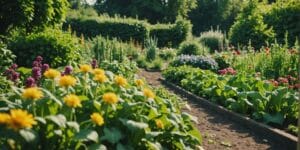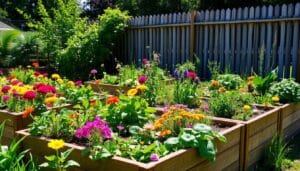Table of Contents
Herbs have been used for centuries as natural remedies. They are a big part of traditional healing practices all over the world. This article will take you on a journey into the world of herbal medicine.
We’ll look at the ancient wisdom and modern science behind these botanical wonders. You’ll learn how herbs can make you healthier, strengthen your immunity, and help with common health issues. We’ll show you how to grow your own herbal garden and use herbs in your daily life.
This guide will reveal the secrets of nature’s healing gifts. It’s your chance to discover the magic of herbs.

Key Takeaways
- Herbs have a rich history as natural remedies used in traditional healing practices worldwide.
- Herbal medicine combines ancient wisdom with modern scientific research.
- Herbs can enhance wellness, boost immunity, and provide natural solutions for common ailments.
- Cultivating an herbal garden and incorporating herbs into daily life can unlock the magic of nature’s healing gifts.
- This article will explore the diverse world of herbal medicine and its benefits for overall health and well-being.
The Ancient Wisdom of Herbal Medicine
Herbal medicine has a long history that spans centuries and continents. For thousands of years, people worldwide have used medicinal plants to help with health issues. From Traditional Chinese Medicine to Ayurvedic healing, these remedies have been key in holistic healthcare.
Exploring the Rich History of Botanical Remedies
Herbal remedies go way back to the earliest civilizations. Ancient Egyptian, Greek, and Roman texts show how they used medicinal plants. These cultures saw the power in plants and used them in their healing practices.
Traditional Herbal Practices from Around the World
Different cultures have their own herbalism and botanical medicine traditions. In Traditional Chinese Medicine, a mix of herbs, minerals, and animal products helps balance the body. Ayurvedic healing in India uses natural remedies to keep people healthy.
These old healing systems still shape today’s phytotherapy. They teach us about the healing power of nature.
“The greatest medicine of all is to teach people how not to need it.” – Hippocrates
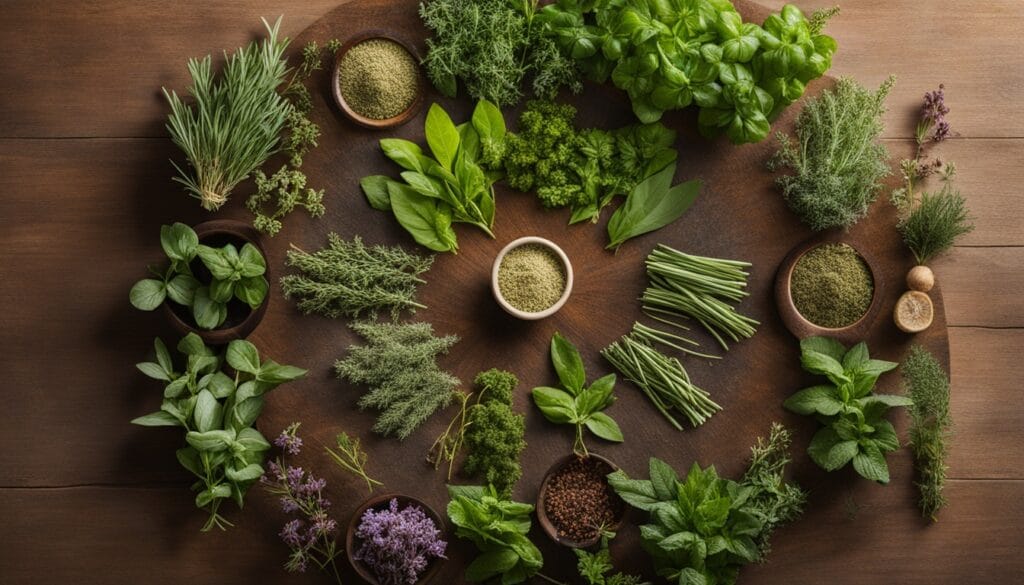
Looking into herbal medicine traditions shows us how connected we are to nature. The wisdom of botanical remedies invites us to look at health in a holistic way.
Unlocking the Power of Herbs
Herbs are natural wonders full of active compounds that help our health. Scientists have studied them a lot. They found out how herbs can help our bodies heal.
Herbs can fight inflammation and boost our immune system. They show how versatile they are in keeping us healthy. Researchers have looked into how botanical medicine works to improve our health.
Herbal remedies and phytotherapy show the strength of herbs. By learning about them, we can use them to get healthier.
| Herb | Potential Health Benefits |
|---|---|
| Turmeric | Anti-inflammatory, antioxidant, and potential benefits for cognitive function |
| Ginger | Anti-nausea, anti-inflammatory, and potential benefits for digestion |
| Chamomile | Calming, anti-anxiety, and potential benefits for sleep quality |
Studying herbs helps us understand their role in health. This research will help us use medicinal plants more effectively for wellness.
“The greatest medicine of all is to teach people how not to need it.” – Hippocrates
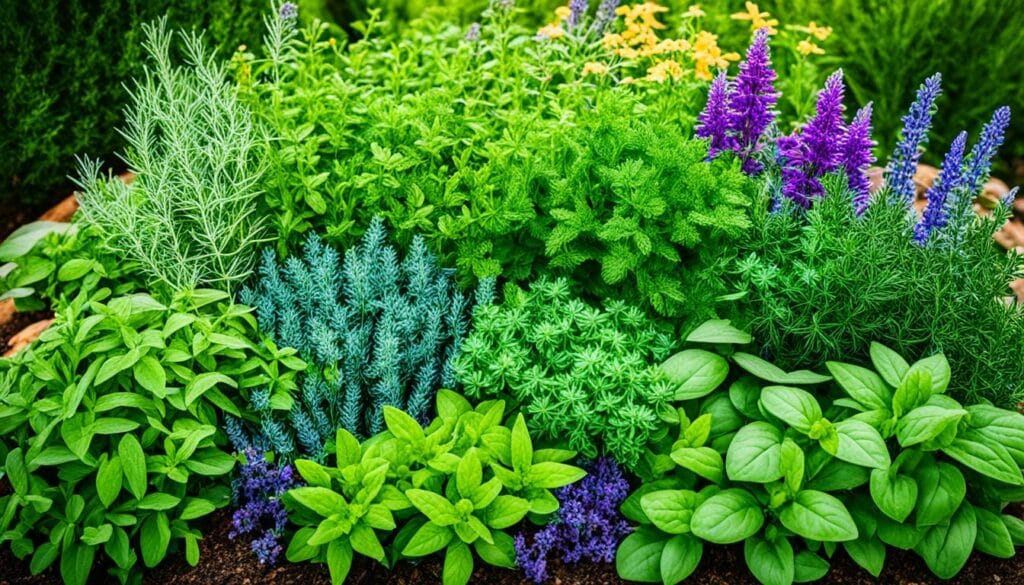
Herb Benefits: Nature’s Gift to Wellness
Herbs are more than just tasty additions to our food. They are powerful allies for our health. They help boost our immune system and ease common health issues.
Boosting Immunity with Natural Herbs
Some herbs can make our immune system stronger. Echinacea is one that helps fight infections. Ginger and turmeric reduce inflammation, which is good for our immune health.
Herbal Remedies for Common Ailments
Herbs can help with many health problems. Chamomile and peppermint ease digestive troubles. Elderberry and garlic support our lungs. For fighting inflammation, willow bark and meadowsweet are good choices.
| Herb | Health Benefits |
|---|---|
| Echinacea | Immune system support, anti-inflammatory |
| Ginger | Anti-inflammatory, digestive aid |
| Turmeric | Anti-inflammatory, antioxidant |
| Chamomile | Digestive soothing, anti-anxiety |
| Peppermint | Digestive aid, respiratory support |
| Elderberry | Immune system support, respiratory health |
| Garlic | Antimicrobial, cardiovascular support |
| Willow bark | Natural pain relief, anti-inflammatory |
| Meadowsweet | Anti-inflammatory, digestive aid |
By using these herbs every day, we can tap into nature’s power. We can support our immunity and treat many common ailments with natural healing.

Growing Your Own Herbal Garden
Cultivating your own herb garden is rewarding and enriching. It’s great for both seasoned and new gardeners. Growing medicinal plants at home gives you natural remedies and connects you with nature.
Essential Tips for Cultivating Medicinal Plants
To make a great herbal garden, follow these key tips:
- Prepare the soil: Cultivation of medicinal plants needs well-draining, rich soil. Add compost or aged manure for the best conditions.
- Choose the right herbs: Pick herbs that fit your climate and garden. Good choices for home herb gardens are lavender, chamomile, echinacea, and peppermint.
- Provide appropriate sunlight: Most medicinal plants love full sun but some like partial shade. Make sure your garden gets the right sunlight for your herbs.
- Practice proper watering: Herb plants need consistent, moderate water. Change your watering based on your area’s climate and rain.
- Harvest and preserve: Harvest your herbs just before they bloom for the best potency. Dry or freeze them for later use.
| Herb | Sun Exposure | Soil Preference | Key Benefits |
|---|---|---|---|
| Lavender | Full sun | Well-drained, sandy soil | Promotes relaxation, aids sleep, skin care |
| Echinacea | Full sun to partial shade | Rich, well-drained soil | Boosts immune system, reduces inflammation |
| Peppermint | Partial shade | Moist, well-drained soil | Aids digestion, freshens breath, natural insect repellent |
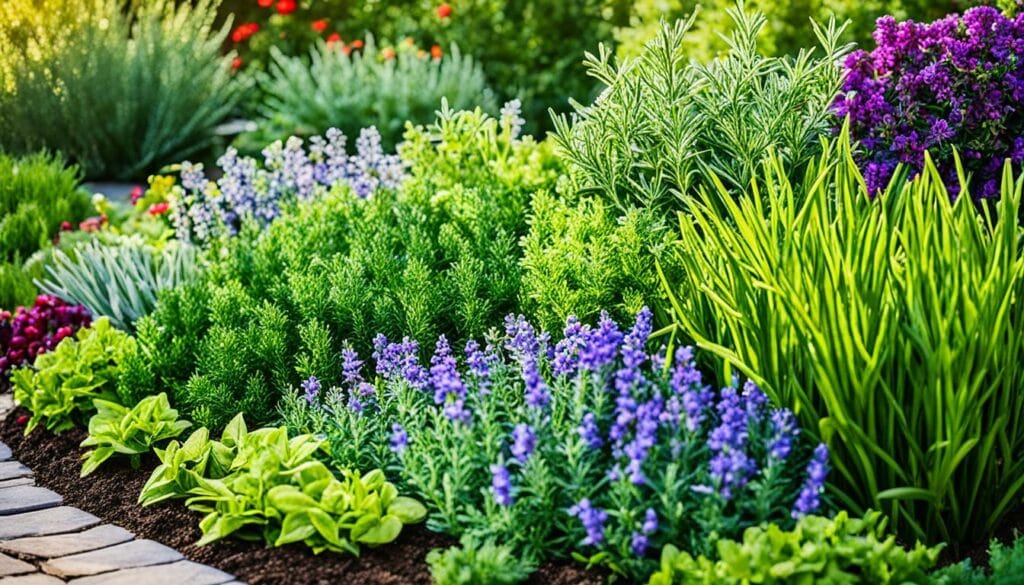
“Growing your own medicinal herbs is a simple yet profound way to connect with nature and take control of your health.”
By following these tips, you can grow a thriving herbal garden. It will give you a lot of medicinal plants for your health. Enjoy making your own natural remedies and using these healing plants.
Incorporating Herbs into Your Daily Life
Using herbs in our daily lives is a simple way to improve our health and well-being. We can enjoy herbal remedies or add fresh herbs to our meals. There are many ways to use herbs every day.
One easy way to use herbs is by drinking herbal tea. You can choose from calming chamomile, refreshing peppermint, or a ginger blend. These teas are great for your health and can make your day better.
Herbs can also be added to your cooking. Try using basil in pasta or rosemary on roasted veggies. Adding herbs can make your meals taste better and be healthier.
If you’re feeling adventurous, you can make your own herbal products. You can make salves or tinctures at home. This is a fun way to use herbs and be more self-sufficient in your daily life.
By using herbs in your daily life, you can improve your health and feel more connected to nature. Start this journey with herbs and enjoy a healthier and more balanced life.
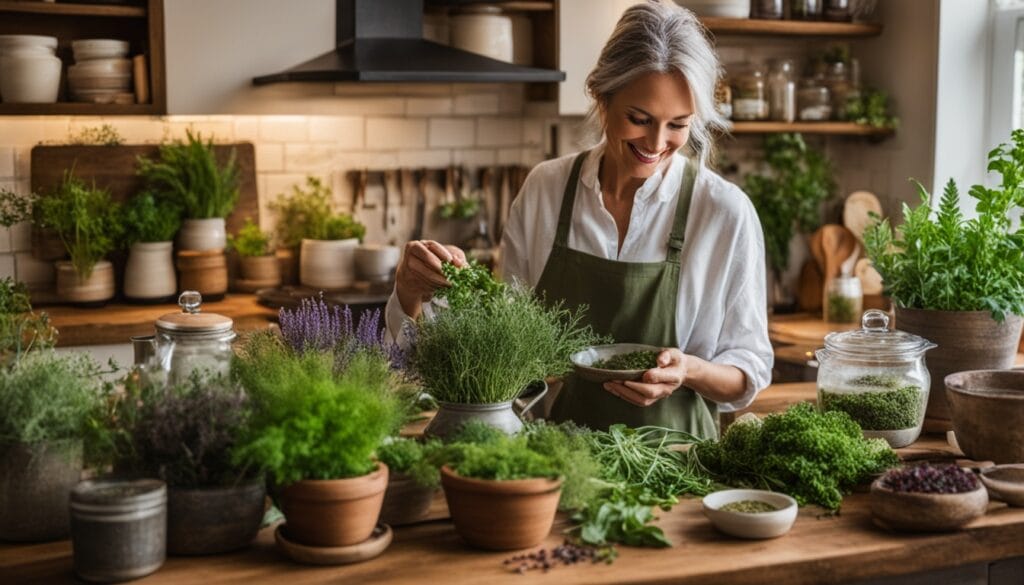
The Art of Herbal Preparations
Herbal remedies and preparations have been around for a long time. They let us use the power of plants for our health and wellness. You can choose from tinctures, teas, and salves for natural self-care.
Tinctures, Teas, and Salves: DIY Herbal Concoctions
Making your own herbal preparations is rewarding. Tinctures are made with alcohol and herbs, making them strong and useful. Teas are easy to make and can be enjoyed hot or cold.
Salves are great for your skin. They mix herbs with carrier oil and then add beeswax or shea butter. This makes a balm that helps with skin issues, eases pain, and more.
- Tinctures: Alcohol-based extracts that concentrate the active compounds of herbs
- Teas: A soothing and accessible way to enjoy the benefits of herbs
- Salves: Nourishing balms made by infusing herbs into carrier oils and thickening with beeswax or shea butter
Learning about herbal preparations lets you take charge of your health. With creativity and the right skills, you can add these natural remedies to your daily routine. This way, you can use the healing power of plants every day.
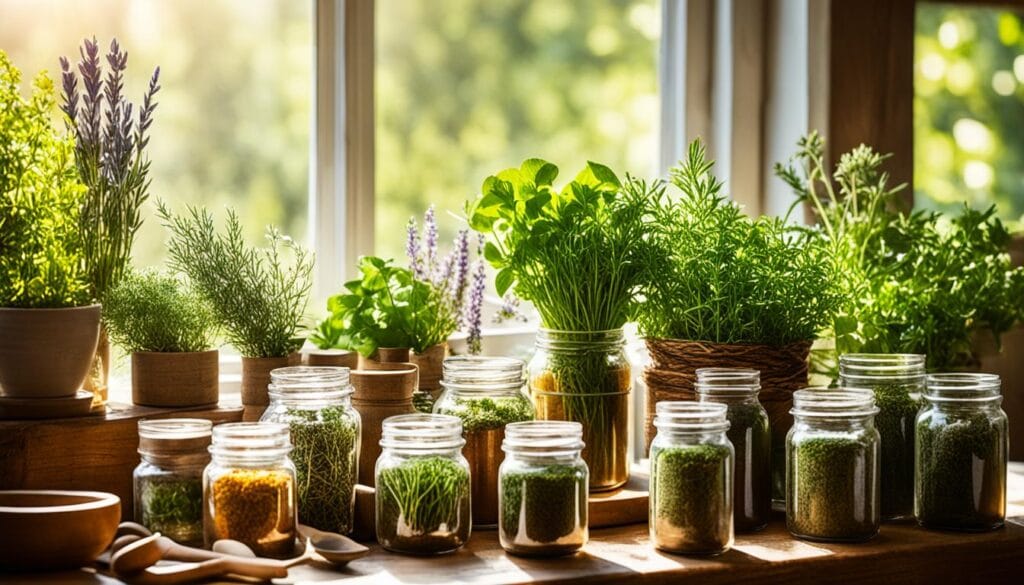
“The true medicine of the future will be the use of simple herbs and natural remedies.”
– Henry Lindlahr
Herbs for Beauty and Skincare
Herbs are great for our skin, not just our health. They can make our skin look better, younger, and more radiant. Let’s look at how natural herbs can change your skincare routine.
Natural Herbal Solutions for Radiant Skin
Herbs are known for making skin healthier. Lavender calms and reduces inflammation, perfect for sensitive skin. Rosemary fights aging signs, and chamomile helps with blemishes.
Adding these herbs to your daily skincare can make your skin glow. You can use herbal products or make your own herbal remedies. Using plants in your skincare is amazing.
| Herb | Skin Benefits |
|---|---|
| Lavender | Calming, anti-inflammatory properties |
| Rosemary | Powerful antioxidant, anti-aging effects |
| Chamomile | Gentle, effective for blemishes and breakouts |
Using herbs in your beauty and skincare can bring out your skin’s best. Discover the power of herbal remedies and see the difference for yourself.
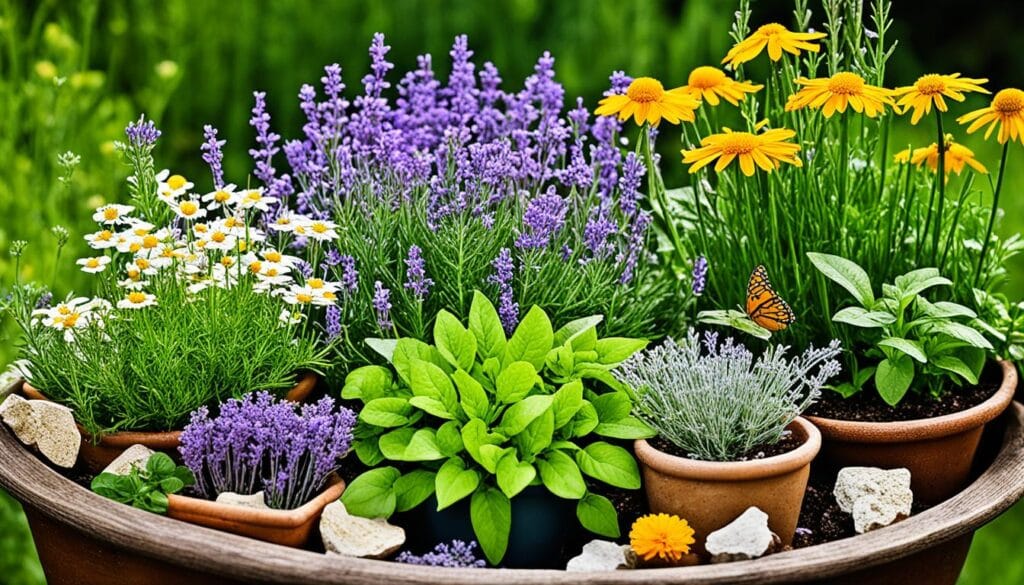
Herbs and Mental Well-being
Herbs are more than just for our physical health. They also help our mental well-being. They can make us feel relaxed and improve our thinking skills. Some herbal remedies are great for keeping our minds balanced and healthy.
Herbs are great for dealing with stress and anxiety. Plants like lavender, chamomile, and lemon balm calm us down. They help us feel peaceful and calm.
Herbs can also help with our mental health and how well we think. Ginkgo biloba might make our memory and focus better. Ashwagandha could help with depression and anxiety, and support our overall wellness.
“Herbal remedies have long been recognized for their ability to nurture the mind and spirit, not just the body. Embracing the power of these natural allies can be a transformative step towards holistic well-being.”
Using herbs in our daily lives can be a thoughtful way to care for ourselves. These plants have special healing powers. They can lead us to inner peace, clear thinking, and better overall wellness.

Embracing Herbalism: A Holistic Approach
Embracing herbalism can change your life for the better. It sees the body as a whole system, focusing on the deep causes of health issues, not just the symptoms. This way, you can take care of your mind, body, and spirit with herbs, herbal remedies, and other holistic health methods.
Our physical, emotional, and spiritual health are deeply connected. Adding herbs and herbal remedies to your self-care can bring balance and energy. It’s like using traditional alternative medicine to help yourself.
Holistic herbalism believes our bodies can heal on their own with the right support. Using herbs and herbal remedies can help with detox, boost the immune system, and treat many health problems.
| Herb | Benefit |
|---|---|
| Chamomile | Reduces inflammation and promotes relaxation |
| Turmeric | Possesses anti-inflammatory and antioxidant properties |
| Ginger | Aids in digestion and can alleviate nausea |
By following holistic herbalism, you start a journey of self-discovery. You learn to listen to your body and use herbs and herbal remedies daily for better health.

“The greatest medicine of all is to teach people how not to need it.” – Hippocrates
The goal of holistic herbalism is to help you take charge of your health. It uses the wisdom of herbs and herbal remedies to improve your balance, energy, and holistic health.
Conclusion
The world of herbs is full of natural wonders. It combines ancient wisdom with modern science. These plants help boost immunity and ease common health issues. They offer a way to improve health and take care of ourselves.
Herbs can nourish the body, calm the mind, or help grow your own medicinal garden. The magic of herbs is always there, waiting to show its power.
We’ve looked into the history and uses of herbal remedies. We’ve seen how different cultures and science see their value. By using these plants, we can heal naturally and improve our health in many ways.
Herbal teas and salves are just a few ways to use these remedies. They let us take charge of our health. This approach to wellness is holistic and empowering.
As we end this journey, we invite you to keep exploring herbs. These plants can nourish, soothe, and inspire you. Whether you’re new to herbs or have been using them for years, there’s more to discover.
Embrace the magic of herbs. Let nature’s gifts lead you to a healthier, happier life.
FAQ
What are the main benefits of using herbs for health and wellness?
Herbs boost the immune system and offer natural remedies for common ailments. They reduce inflammation and support overall well-being. Many herbs have active compounds that help the body heal naturally.
How can I start growing my own herbal garden?
Starting an herbal garden is rewarding for having fresh, medicinal plants. Key tips include choosing the right soil and herbs for your climate. Also, use proper planting techniques and keep the garden watered and cared for.
What are some common herbal preparations I can make at home?
You can make tinctures, teas, and salves at home. Tinctures are alcohol-based extracts that focus on the herbs’ active compounds. Teas let you enjoy herbs through infusions. Salves are for the skin and can soothe and nourish it.
How can I incorporate herbs into my daily life?
Adding herbs to your daily life is easy. You can brew herbal tea, add fresh herbs to your cooking, or use herbal personal care products. You can also make your own tinctures or salves for health and wellness.
What are some herbs that can support mental well-being?
Herbs like chamomile, lavender, and lemon balm help calm and uplift the mind. They reduce stress and improve focus, supporting mental health.



